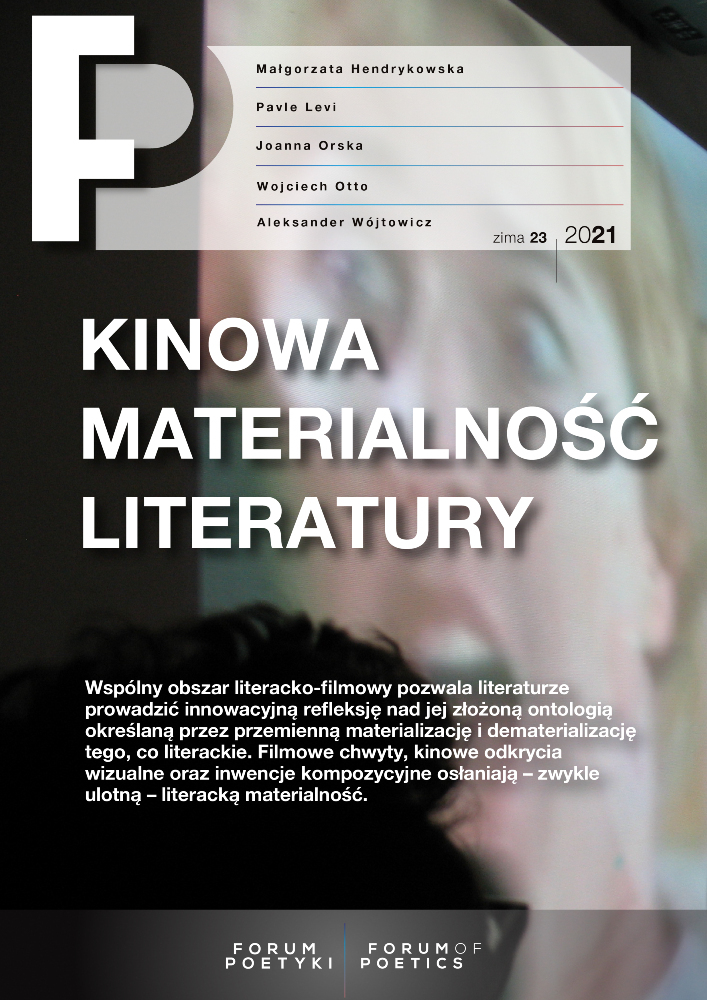Abstract
The vast and varied literary output of Stefania Zahorska (1889-1961) including, among others, articles on art history and theory, philosophy, psychology, history of culture, out of which reflections on film theory and criticism have the most prominent position. Zahorska was the most distinguished film critic of the Polish interwar period, due not only to her talent for writing and criticism, but also her erudition, education, and most importantly, independent judgment. While in the 1930s film was commonly seen as a parasite preying on literature, Zahorska in her essay “What literature owes film”, published in 1934 in Kurier Literacko-Naukowy, states that the novel was also slowly getting something from film. She focused on the contemporary Polish novel and the potential benefits which literature could gain from film. She convincingly demonstrated how film inspirations influenced literary concreteness, how – under film’s influence – the spatiotemporal model changed in literature. By analyzing novels “infected” with film, she pointed to its role in shaping contemporary literary metaphors. Her originality of thought stemmed from her breaking from popular discourse regarding the similarities between an adaptation and its source, and her indicating that the relation between film and literature is not simply unidirectional: from literature to film. It can be described beyond the traditional domain of adaptation, in terms of metapoetics and the aesthetics of word and moving pictures. In Poland hers was an important, pioneering voice in terms of how the relations between film and literature were seen.
References
Choromański, Michał. Skandal w wesołych bagniskach. Warszawa: PIW, 1993.
Choromański, Michał. Zazdrość i medycyna. Warszawa: Gebethner i Wolff, 1933.
Cybulska, Maja Elżbieta. Potwierdzone istnienie: archiwum Stefanii Zahorskiej. Londyn: Polska Fundacja Kulturalna, 1988.
Gojawiczyńska, Pola. Ziemia Elżbiety. Warszawa: Towarzystwo Wydawnicze „Rój”, 1934.
Hendrykowska, Małgorzata. „O szczególnych powinowactwach literatury i kina w refleksji Stefanii Zahorskiej”. Przestrzenie Teorii nr 32 (2019): 167–79.
Irzykowski, Karol. „Człowiek przed soczewką, czyli sprzedane samobójstwo. Dramat w 1 akcie”. Pion nr 24–25 (1938).
Irzykowski, Karol. Dziesiąta muza: zagadnienia estetyczne kina. Kraków: Krakowska Spółka Wydawnicza, 1924.
Kaden-Bandrowski, Juliusz. Czarne skrzydła. Katowice: Wydawnictwo Literackie, 1928.
Karcz, Danuta. „Stefanii Zahorskiej walka o treść”. Kwartalnik Filmowy nr 1–2 (1962): 47–92.
Mizerkiewicz, Tomasz. Po tamtej stronie tekstów: literatura polska a nowoczesna kultura obecności. Poznań: Wydawnictwo Naukowe UAM, 2013.
Nasiłowska, Anna. „Interdyscyplinarny umysł Stefanii Zahorskiej”. Kwartalnik Historii Nauki i Techniki nr 3–4 (2012).
Osiński, Jakub. „Biedni emigranci patrzą na getto. O Smoczej 13 Stefanii Zahorskiej”. Teksty Drugie nr 3 (2018): 399–417.
Pilch, Anna. Symbolika form i kolorów: o krytyce artystycznej Stefanii Zahorskiej. Kraków: Księgarnia Akademicka, 2004.
Strug, Andrzej. Żółty krzyż. Warszawa: Gebethner i Wolff, 1933.
Szweykowski, Zygmunt. „Nowela Prusa Widziadła”. Pion nr 15 (1936).
Zahorska, Stefania. Eugenjusz Żak. Warszawa: Gebethner & Wolff, 1927.
Zahorska, Stefania. „Film w naftalinie”. Wiek XX nr 3 (1928): 4.
Zahorska, Stefania. O pierwszych śladach odrodzenia w Polsce, t. 2. Kraków: Prace Komisji Historii Sztuki PAU, 1921.
Zahorska, Stefania. Szkice o literaturze i sztuce. Zredagowane przez Paweł Kądziela. Warszawa: Wydawnictwo Książkowe Twój Styl, 1995.
Zahorska, Stefania. „Twórczość i świadomość”. Wianki nr 3 (1919): 13–14.
Zahorska, Stefania. Wybór pism. Reportaże, publicystyka, eseje. Zredagowane przez Anna Nasiłowska. Warszawa: IBL PAN, 2010.
Zahorska, Stefania. „Z ruchu filmowego w Niemczech”. Wiadomości Literackie 195, nr 39 (1927).
Zahorska, Stefania. „Zagadnienia formalne filmu”. Przegląd Filozoficzny XXXI, nr 1–2 (1928): 192–99.
Zahorska, Stefania i Jan Matejko. Jan Matejko. Warszawa: Gebethner & Wolff, 1925.
Zahorska, Stefania i Adam Pragier. „Przychodź do mnie”: listy Stefanii Zahorskiej do Leonii Jabłonkówny i listy Adama Pragiera. Zredagowane przez Maja Elżbieta Cybulska. Londyn: Polska Fundacja Kulturalna, 1998
License
Authors of articles are responsible for securing the rights to other publications (texts, tables, drawings and other illustrations) quoted or reproduced in their texts.

